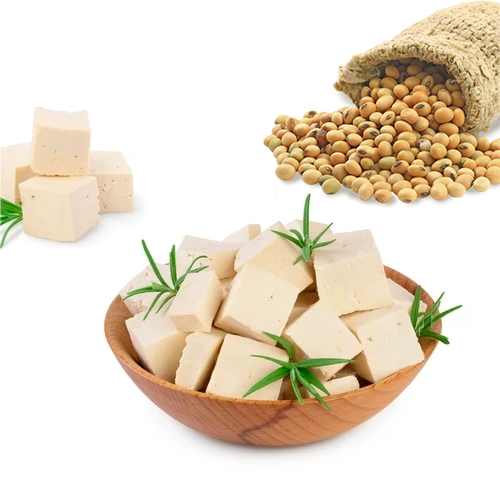Soya cheese, also known as soy cheese or vegan cheese, is a plant-based alternative to
traditional dairy cheese. It is made from soy milk and various plant-based ingredients to
replicate the taste, texture, and melting properties of dairy cheese. Here's some information
about soya cheese :
Ingredients :
Soya cheese typically includes the following key ingredients :
- Soy Milk : Soy milk serves as the primary ingredient. It is made from
soaked and blended soybeans mixed with water and serves as the base for the cheese.
- Protein Sources : Various protein sources, such as soy protein isolate,
almond protein, or other plant-based proteins, are used to provide the necessary structure
and texture to mimic dairy cheese.
- Emulsifiers : Emulsifiers like lecithin are added to create a smooth and
creamy texture in the cheese.
- Stabilizers : Stabilizers like agar-agar, carrageenan, or other plant-based
substances are used to improve the consistency and prevent separation of the ingredients.
- Flavourings : Natural or artificial flavourings are added to replicate the
taste of various cheese types, including cheddar, mozzarella, or Swiss.
- Salt : Salt is added to enhance the flavour of the cheese.
- Nutritional Yeast (optional) : Nutritional yeast can be included to provide a
cheesy flavour and added nutrients.
Production Process :
The production of soya cheese involves several steps :
- Soy Milk Preparation : Soybeans are soaked, blended, and mixed with water to
create soy milk. The milk is then heated to kill any potential enzyme inhibitors that could
affect taste and texture.
- Protein Incorporation :Various plant-based proteins are added to the soy milk
to create the desired texture and structure of the cheese.
- Emulsification and Stabilization : Emulsifiers and stabilizers are added to
create a smooth and consistent mixture, ensuring that the fat and water components do not
separate.
- Flavour Development : Flavourings are introduced to replicate the taste of the
desired cheese type, such as cheddar or mozzarella.
- Heating and Melting (optional) : Some varieties of soya cheese are heat-treated
to allow melting, making them suitable for dishes like pizzas and quesadillas.
- Packaging : The final soya cheese is packaged in various forms, such as blocks,
slices, or shreds, and stored at low temperatures to maintain its texture.
Nutritional Benefits :
Soya cheese offers several nutritional benefits :
- Soy Milk Preparation : Soybeans are soaked, blended, and mixed with water to
create soy milk. The milk is then heated to kill any potential enzyme inhibitors that could
affect taste and texture.
- Protein Incorporation : Various plant-based proteins are added to the soy milk
to create the desired texture and structure of the cheese.
- Emulsification and Stabilization : Emulsifiers and stabilizers are added to
create a smooth and consistent mixture, ensuring that the fat and water components do not
separate.
- Flavour Development : Flavourings are introduced to replicate the taste of the
desired cheese type, such as cheddar or mozzarella.
- Heating and Melting (optional) : Some varieties of soya cheese are heat-treated
to allow melting, making them suitable for dishes like pizzas and quesadillas.
- Packaging : The final soya cheese is packaged in various forms, such as blocks,
slices, or shreds, and stored at low temperatures to maintain its texture.
Nutritional Benefits :
Soya cheese offers several nutritional benefits :
- Dairy-Free : Soya cheese is a dairy-free alternative to traditional dairy
cheese, making it suitable for individuals with dairy allergies, lactose intolerance, or those
following a vegan or dairy-free diet.
- Plant-Based Protein : It provides plant-based protein, making it an excellent
source of protein for vegetarians and vegans.
- Lactose-Free : It is naturally lactose-free.
- Lower in Saturated Fat : Soya curd can be used in baking recipes to replace
dairy curd or yogurt in cakes, muffins, and pancakes.
- Variety of Flavors : Soya cheese is available in various Flavors and styles,
including cheddar, mozzarella, Swiss, and more.
Culinary Uses :
Soya cheese can be used in a variety of culinary applications, including :
- Pizza : It can be used as a topping on vegan pizzas.
- Sandwiches and Wraps : Soya cheese slices or shreds can be used in sandwiches,
paninis, and wraps.
- Quesadillas and Tacos : It can be used to create dairy-free quesadillas and
tacos.
- Pasta : Soya cheese can be melted into pasta dishes.
- Cheese Boards : It can be used on vegan cheese boards, served with crackers and
fruit.
- Salads : It can be used as a topping on salads.
Soya cheese is a versatile and dairy-free alternative to traditional cheese, offering various Flavors
and textures suitable for a wide range of dishes. It is a favourite among individuals with dietary
restrictions and those seeking plant-based or vegan options.
